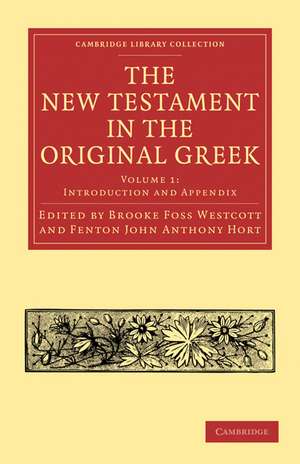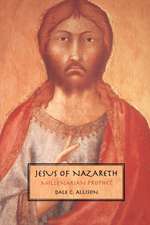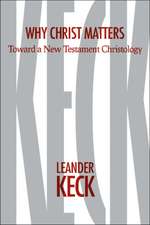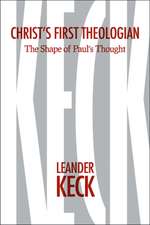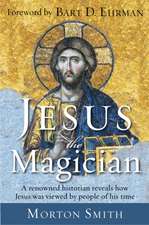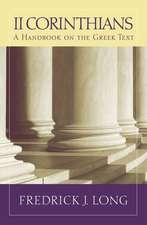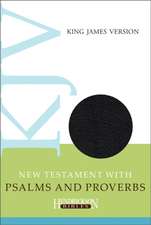The New Testament in the Original Greek: Cambridge Library Collection - Biblical Studies
Editat de Brooke Foss Westcott, Fenton John Anthony Horten Limba Engleză Paperback – 24 feb 2010
| Toate formatele și edițiile | Preț | Express |
|---|---|---|
| Paperback (2) | 469.04 lei 6-8 săpt. | |
| Cambridge University Press – 24 feb 2010 | 469.04 lei 6-8 săpt. | |
| Cambridge University Press – oct 2010 | 520.21 lei 6-8 săpt. |
Din seria Cambridge Library Collection - Biblical Studies
-
 Preț: 211.81 lei
Preț: 211.81 lei -
 Preț: 280.34 lei
Preț: 280.34 lei -
 Preț: 242.80 lei
Preț: 242.80 lei -
 Preț: 370.98 lei
Preț: 370.98 lei -
 Preț: 280.72 lei
Preț: 280.72 lei -
 Preț: 281.86 lei
Preț: 281.86 lei -
 Preț: 226.49 lei
Preț: 226.49 lei -
 Preț: 216.22 lei
Preț: 216.22 lei -
 Preț: 224.87 lei
Preț: 224.87 lei -
 Preț: 357.56 lei
Preț: 357.56 lei -
 Preț: 335.16 lei
Preț: 335.16 lei -
 Preț: 244.91 lei
Preț: 244.91 lei -
 Preț: 263.67 lei
Preț: 263.67 lei -
 Preț: 286.11 lei
Preț: 286.11 lei -
 Preț: 281.70 lei
Preț: 281.70 lei -
 Preț: 281.70 lei
Preț: 281.70 lei -
 Preț: 265.36 lei
Preț: 265.36 lei - 19%
 Preț: 494.05 lei
Preț: 494.05 lei -
 Preț: 241.83 lei
Preț: 241.83 lei -
 Preț: 277.67 lei
Preț: 277.67 lei -
 Preț: 240.30 lei
Preț: 240.30 lei - 19%
 Preț: 459.05 lei
Preț: 459.05 lei -
 Preț: 534.47 lei
Preț: 534.47 lei -
 Preț: 244.16 lei
Preț: 244.16 lei -
 Preț: 468.27 lei
Preț: 468.27 lei -
 Preț: 335.77 lei
Preț: 335.77 lei -
 Preț: 420.82 lei
Preț: 420.82 lei -
 Preț: 228.62 lei
Preț: 228.62 lei -
 Preț: 243.57 lei
Preț: 243.57 lei -
 Preț: 370.21 lei
Preț: 370.21 lei - 19%
 Preț: 463.24 lei
Preț: 463.24 lei -
 Preț: 422.01 lei
Preț: 422.01 lei -
 Preț: 283.62 lei
Preț: 283.62 lei -
 Preț: 528.41 lei
Preț: 528.41 lei -
 Preț: 477.38 lei
Preț: 477.38 lei -
 Preț: 282.08 lei
Preț: 282.08 lei -
 Preț: 338.14 lei
Preț: 338.14 lei -
 Preț: 227.63 lei
Preț: 227.63 lei -
 Preț: 283.24 lei
Preț: 283.24 lei -
 Preț: 266.33 lei
Preț: 266.33 lei
Preț: 469.04 lei
Nou
Puncte Express: 704
Preț estimativ în valută:
89.75€ • 93.71$ • 74.28£
89.75€ • 93.71$ • 74.28£
Carte tipărită la comandă
Livrare economică 04-18 aprilie
Preluare comenzi: 021 569.72.76
Specificații
ISBN-13: 9781108007085
ISBN-10: 1108007082
Pagini: 550
Ilustrații: 2 tables
Dimensiuni: 140 x 216 x 31 mm
Greutate: 0.69 kg
Editura: Cambridge University Press
Colecția Cambridge University Press
Seria Cambridge Library Collection - Biblical Studies
Locul publicării:Cambridge, United Kingdom
ISBN-10: 1108007082
Pagini: 550
Ilustrații: 2 tables
Dimensiuni: 140 x 216 x 31 mm
Greutate: 0.69 kg
Editura: Cambridge University Press
Colecția Cambridge University Press
Seria Cambridge Library Collection - Biblical Studies
Locul publicării:Cambridge, United Kingdom
Cuprins
Prefatory remarks; Part 1. The Need of Criticism for the Text of the New Testament: 1. Transmission by writing; 2. Transmission by printed editions; 3. History of present edition; Part 2. The Methods of Textual Criticism: Section 1. Internal Evidence of Readings: 1. Intrinsic probability; 2. Transcriptional probability; Section 2. Internal Evidence of Documents; Section 3. Genealogical Evidence: 1. Simple or divergent genealogy; 2. Genealogy and number; 3. Manner of discovering genealogy; 4. Complications of genealogy by mixture; 5. Applications of genealogy; 6. Variable use of genealogy according to unequal preservation of documents; Section 4. Internal Evidence of Groups; Section 5. Recapitulation of Methods in Relation to Each Other; Section 6. Criticism as Dealing with Errors Antecedent to Existing Texts: 1. Primitive errors; 2. Removal of primitive errors by conjecture; Part 3. Application of Principles of Criticism to the Text of the New Testament: Section 1. Preliminary Chronological Survey of Documents: 1. Greek MSS; 2. Versions; 3. Fathers; 4. Documentary preparation for this edition; Section 2. Results of Genealogical Evidence Proper: 1. Determination of the genealogical relations of the chief ancient texts; 2. Characteristics of the chief ancient texts; 3. Sketch of Postnicene textual history; 4. Relations of the principal extant documents to the chief ancient texts; 5. Identification and estimation of readings as belonging to the chief ancient texts; 6. Review of previous criticism with reference to ancient texts; Section 3. Results of Internal Evidence of Groups and Documents: 1. Documentary groups as limited by reference to primary Greek MSS generally; 2. Documentary groups as limited by reference to the best primary Greek MSS; Section 4. Substantial Integrity of the Purest Transmitted Text; Part 4. Nature and Details of this Edition; Appendix 1. Notes on select readings; Appendix 2. Notes on orthographical alternative readings; Appendix 3. Quotations from the Old Testament.
Descriere
This book describes the revolutionary methods used by Westcott and Hort in editing the Greek New Testament (1881).
